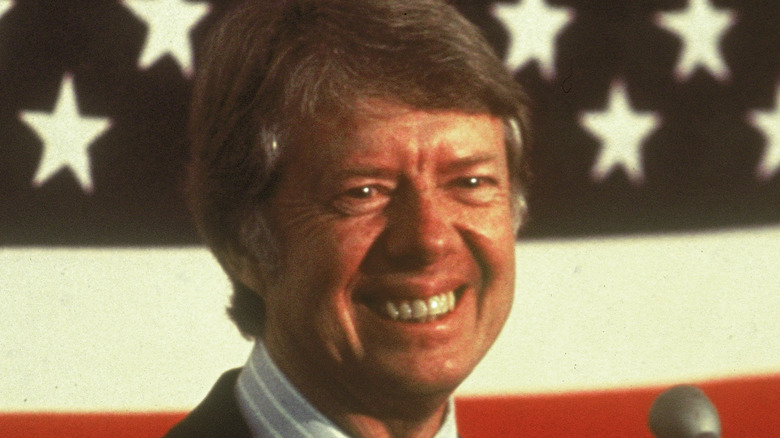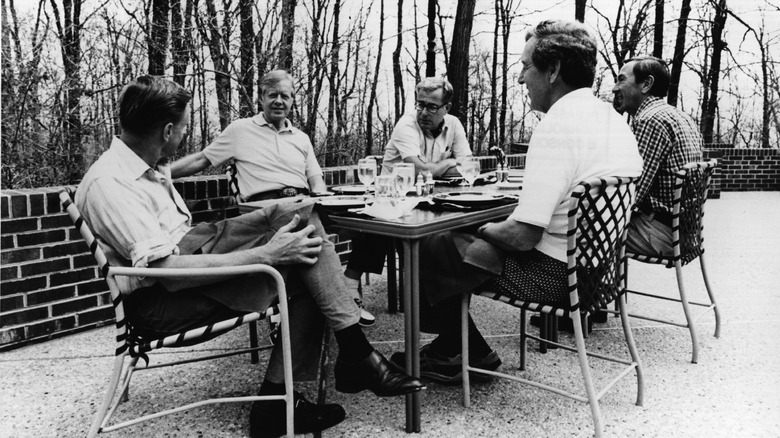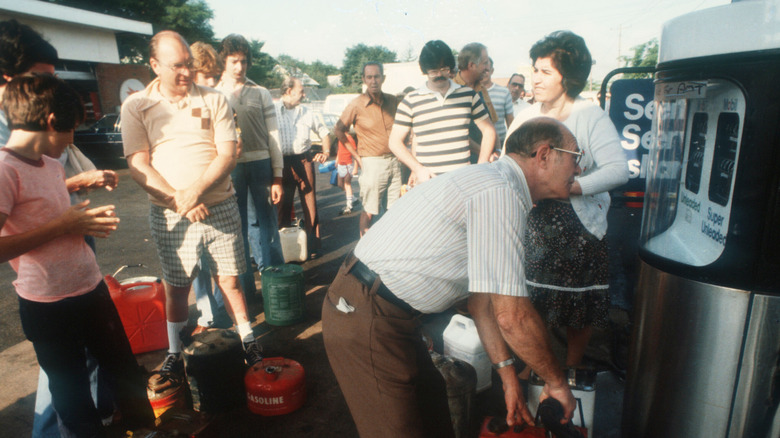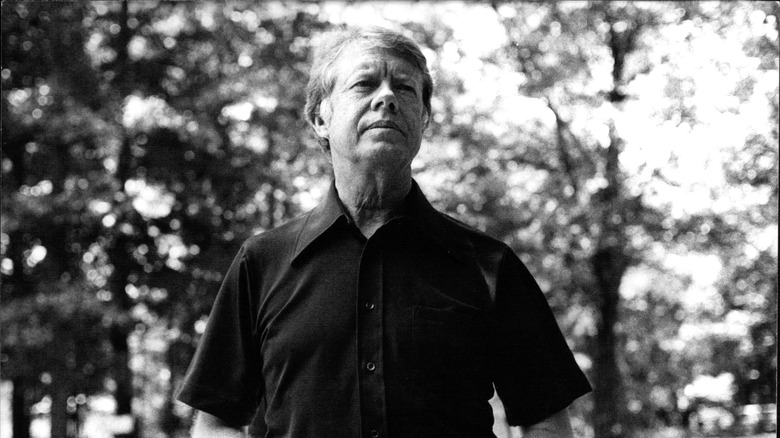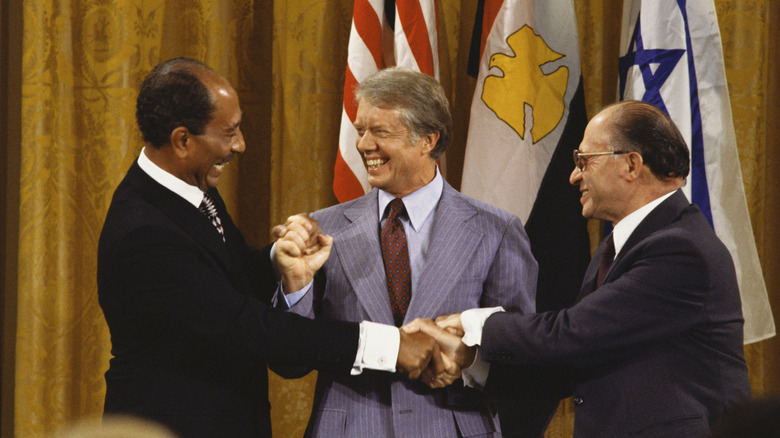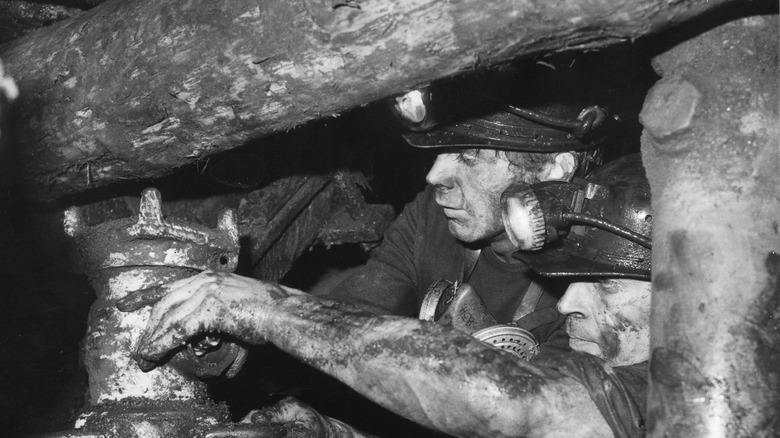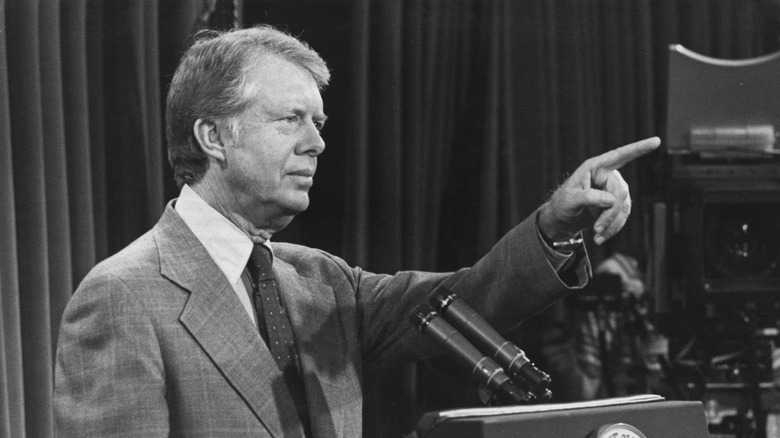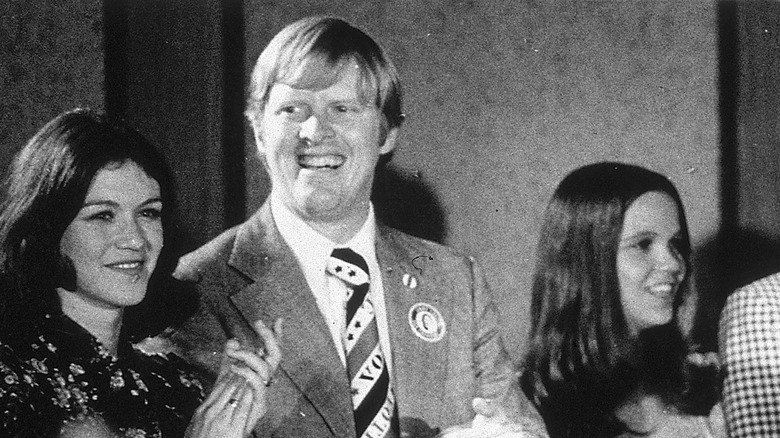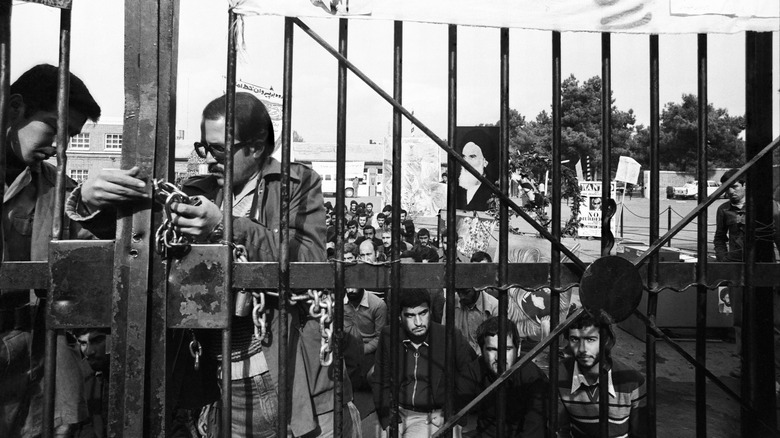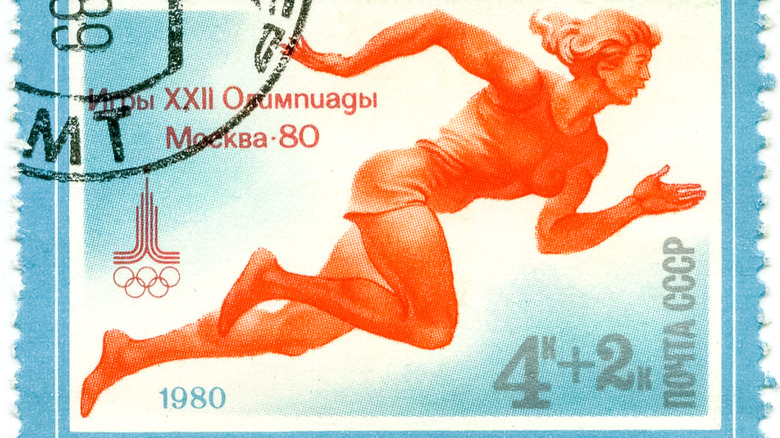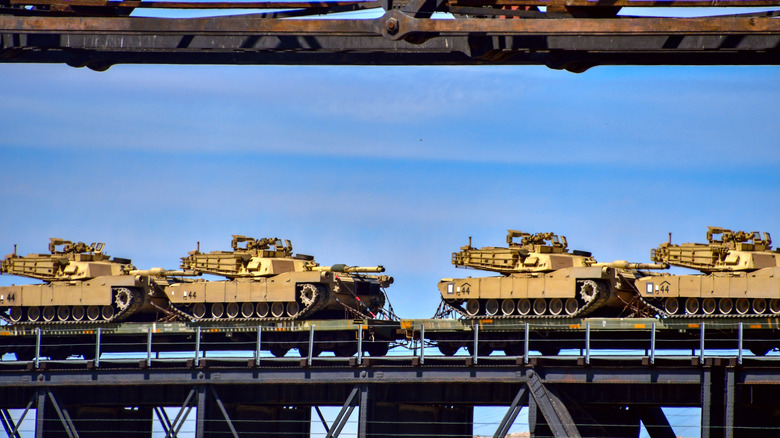Questionable Things About Jimmy Carter's Presidency
Born in 1924, former president James "Jimmy" Carter is nearing the century mark, per Britannica. While his time as POTUS is almost universally seen as lackluster, in Carter's post-presidency life, Carter has achieved a reputation as a man with a golden heart. He is known for his kindness, generosity, and tireless work on behalf of others, including countless hours dedicated to the construction of homes for disadvantaged people through Habitat for Humanity. Today, he is widely respected as an elder statesman, humanitarian, and author. He and his wife, Roslyn, continue to celebrate their decades-long marriage (and counting), per CNBC.
So what was it about this man who has proved himself so worthy of admiration, capable, indefatigable, honorable, and likable in his many years after serving as president that made his single term in office such a flop? Many have argued that Carter was simply not up to the demands of the job — not in temperament, anyway, with his intellect rarely having been questioned. One can turn to a quote from the 2018 film "Black Panther" for insight here, wherein the character King T'Chaka says to his son T'Challa (via IMDB), "You're a good man with a good heart. And it's hard for a good man to be king." Good heart aside, there were still some questionable moments from the administration of the 39th president.
Jimmy Carter filled his administration with friends from Georgia
Jimmy Carter is a man who values friends and family, and that was on clear and perhaps questionable display when the newly elected president began to select the people to staff his administration. According to a 1977 article from The Washington Post, when Carter revealed who he had selected to be his chief White House aides, all but one were people he had already had relationships with in Georgia. As noted by ArtsATL, this was both "a strength and weakness." On one hand, the group, sometimes called the "Georgia Mafia," worked smoothly together because they had developed a rapport. But Carter's prioritization of people he already knew also meant that he often overlooked potential candidates who would have proved better suited and more effective.
If this problem seems to be all too familiar, that's because it is. Recall that not too long ago another president took this practice of turning to familiar parties for staffing to the very highest degree. As noted by The Boston Globe, former president Donald Trump appointed his own children and their spouses to positions of great power within the White House following his 2016 election.
He did little to improve the fraught economic landscape he inherited
Jimmy Carter took office in 1977 at a time of economic peril in the nation and abroad. Per the United States Department of Labor, the U.S. was actively in a recession as Carter came to power, as he had inherited the economic woes of the nation from his successor, Gerald Ford. It proved a burden Carter and his team were ill-equipped to handle. While Carter stated an early goal to reduce unemployment and did see the number of jobless people fall early in his term, the cost of living and inflation rates skyrocketed, so even employed people were soon suffering financially. Inflation reached double-digit levels early in the Carter administration's term and would come to define much of that presidency.
And one of the most tangible issues Americans faced during Carter's presidency was a crippling gasoline shortage that came in 1979, it being the second such shortage of the decade, according to Smithsonian Magazine. The earlier gas crisis, in 1973, was caused by huge price hikes and shipping restrictions imposed by the Organization of Petroleum Exporting Countries (OPEC). The gas crisis of 1979 was triggered primarily by the Iranian Revolution, per Investopedia, but the problems also lay largely at the feet of federal regulators who had imposed inefficient regulations on many domestic refineries. Thus the renewed ire that was directed towards Carter's White House was not without basis.
Jimmy Carter had mixed messaging on military spending
Jimmy Carter promised he would reduce military spending by between $5 to $7 million per year were he to win office, according to a 1978 report from the Naval War College Review (via JSTOR). With the United States' long and calamitous engagement in the Vietnam War finally over, reducing military spending might not only benefit the economy but also ease relations between the U.S. and the Soviet Union amid Cold War tensions.
However, once elected to office, Carter promptly made promises to America's NATO allies to increase defense spending by 3% annually in order to bolster that essential alliance's ability to remain a bulwark against the USSR and its proxies. This was one of the first and clearest examples of Carter being motivated initially by good intentions and then having to face real-world situations that forced him to compromise not only his own ideals but also to forgo a pledge he had made to the American people who elected him as their leader and, therefore, as head of the armed forces.
Jimmy Carter increased the flow of weapons to Indonesian military
According to an interview with scholar Noam Chomsky (via YouTube), Jimmy Carter and his administration did nothing to stop Indonesia's deadly and ruinous invasion and occupation of its neighbor, East Timor, which had been enabled in Gerald Ford's presidency. Despite the knowledge that Indonesia was waging what Chomsky called "near-genocide," the Carter White House increased the flow of weaponry that was channeled to Indonesia's military. Per Chomksy, even as Indonesia's violence against East Timor "peaked" in 1978, America kept its weapons and munitions supplies headed to the archipelago nation.
Then, in spite of a human rights-inspired movement within the U.S. Congress that sought to stop shipments of weapons to Indonesia, Carter's White House found a backdoor way to keep the deadly hardware flowing. Carter's vice president arranged for Israel to send American-made Skyhawk aircraft to Indonesia. Ultimately, with both the direct and the surreptitious support of two American presidential administrations, nearly a quarter of the population of East Timor would be killed. Indonesian aggression against the tiny nation continued in some form until the turn of the 21st century, per History, when East Timor finally secured its independence.
The Camp David Accords he signed were catastrophe in practice
The images still resonate today: standing before the flags of their three nations, then U.S. president Jimmy Carter, Israeli Prime Minister Menachem Begin, and Egyptian president Anwar Sadat all held hands together and smiled brightly. With the Camp David Accords, peace had been declared in one of the most notorious hotspots of violence on the planet, and age-old tensions between Egypt and Israel were to be dissolved, per Britannica.
The breakthrough in relations came after Carter's negotiations at the official presidential retreat at Camp David in Maryland. Sadat and Begin were jointly awarded the Nobel Prize for peace in 1978. But as the realities of history would show, this "Framework for Peace in the Middle East," as the agreements were formally known, was really more of a house of cards. While Egypt and Israel did cease hostilities toward one another and accepted a mutually agreed upon border, most other Middle Eastern nations roundly rejected the Camp David Accords agreements.
Egypt was expelled from the Arab League, while the Palestinian Liberation League pivoted toward increased militancy. Overall, per the Office of the Historian of the U.S. State Department, the agreements led to more strife between Israelis and Palestinians rather than leading to peace in the region.
Jimmy Carter did little to end a massive coal miner strike
In December 1977, 160,000 American coal miners walked off the job. They were striking not to secure higher wages or better working conditions but to reserve the very right to strike, per ISR. The miners wanted the Bituminous Coal Operators Association (BCOA) to guarantee their right to strike, and for even smaller segments of the union to be able to strike independently of the entire organization of miners. The strike would end up lasting a painstaking 111 days and would draw in then-president Jimmy Carter with a damaging effect on his reputation.
With the strike damaging U.S. energy infrastructure and economy, Carter initially proposed a settlement that addressed only a few of the miners' demands such as blocking fines imposed on striking mine workers. But after the union rejected this proposal, Carter invoked a national emergency provision of the Taft-Hartley Act, a bill passed in 1947 that was intended to limit the power of striking unions in favor of the national interest.
His administration hoped to break the strike one mine at a time, but, faced with the real threat of violent uprisings by miners, the government backed down. Soon the miners settled for a desultory agreement that failed to meet most of their demands. But, after such a long period of work stoppage, they needed a return to wages. It was essentially a loss for all parties — the miners, mine operators, and the White House included.
The July 15, 1979 Malaise Speech debacle
On July 15, 1979, President Jimmy Carter delivered a speech meant to stir the hearts and minds of the American people, but in effect, it led to more gnashing of teeth and clenching of bowels. It would come to be known as the "Malaise Speech" despite the fact that, per NPR, Carter never actually used the word "malaise" as he faced the cameras.
What Carter did say, among many other things, was (via American Rhetoric): "I want to speak to you first tonight about a subject even more serious than energy or inflation. I want to talk to you right now about a fundamental threat to American democracy." That threat, per Carter, was "a crisis of confidence" that was "threatening to destroy the social and the political fabric of America."
In essence, Carter told the American people that the biggest problem in the country was their own bad attitudes. Although NPR notes the speech may have been intended to push Americans to be "more self-inquisitive," Carter "essentially condemns the American way of life." Perhaps intended to be a speech on par with Franklin D. Roosevelt's famed, "The only thing we have to fear is fear itself" remarks, Carter's "Malaise Speech" did end up tarnishing his image.
His brother worked for the Libyan government
For a while in the 1970s and early 1980s, Jimmy Carter's brother was very much in the national news, and not for good reasons. As noted by Britannica, Billy Carter, born in 1937, was not just separated from his brother by a notable number of years, but also by a markedly different temperament and way of living. Known as a "beer-drinking good ol' boy," who even briefly lent his name to a brewing company that sold a brand called "Billy Beer," Billy Carter died in 1988 due to pancreatic cancer. Unfortunately for Billy Carter — though by his own fault — his rather short life is remembered primarily not for working with a beer company, but with a dictator.
In 1980, per The Washington Post, it came to light that Billy Carter, who had made multiple trips to Libya, then ruled by Colonel Muammar Qaddafi, had been paid as much as $220,000 by the Libyan government for what was shadily titled compensation for promotional work he had done on behalf of the dictator's government. It was clear to all, of course, that Billy Carter was essentially being bribed for the access and influence he had with his brother, the President of the United States of America.
Jimmy Carter did not end the Iranian hostage crisis
In 1979, everything changed in Iran. The Shah, Iran's longtime semi-dictatorial ruler (and a close ally of the United States) was deposed during a revolution led by radical Islamic fundamentalists — many of them students at the time — and the balance of power in the nation shifted irrevocably, per Britannica. In the process of this overthrow and restructuring, on November 4, 1979, 50 Americans who had previously staffed the U.S. embassy in Tehran were taken hostage for 444 days, according to the Office of the Historian of the State Department. This long captivity would come to be known as the Iranian Hostage Crisis, arguably the greatest stain on Jimmy Carter's presidency.
What followed initially was a surge of patriotic fervor that Carter could likely have used to bolster his popularity, but as the captivity of the American hostages drew out, his popularity would instead plummet. The situation was made worse when a failed rescue mission left eight dead. In fact, it may only have been because the Iran-Iraq war broke out about a year into the hostage crisis that they began to negotiate with the U.S. Regardless, the hostages were ultimately released on January 20, 1981 — a proverbial slap in the face for Carter — for this was the day that his successor Ronald Reagan was inaugurated into office.
His boycott of the 1980 Olympics was a catastrophe
In December 1979, the USSR sent troops, tanks, aircraft, and munitions to Afghanistan — marking the first Soviet action on foreign soil in more than three decades, per Politico. The Soviet invasion of Afghanistan would have such complex and lasting implications for geopolitics and military operations in the future that it would have been difficult for anyone to fathom the full scope of things at the time. But what president Jimmy Carter did know was that he had to take some action against the communist aggressors. The "action" he chose ended up being an impotent rebuke in the form of a boycott of the 1980 Summer Olympics taking place in the Soviet capital of Moscow.
The boycott was an action recommended by West Germany's ambassador to NATO and one that many in Washington and the press supported. With few other options with which he could punish the USSR, Carter got on board. But the 1980 Olympic boycott was a debacle from the start. While initially, it had the support of a bit more than half of the American public, most all American Olympic athletes were outraged at not being able to compete on the world stage. And when the U.S. failed to convince many nations to join the boycott, with more than 80 countries eventually participating in the Moscow games, the action came to be seen as a total diplomatic failure.
Jimmy Carter dramatically increased defense projects
Jimmy Carter came into the White House promising to slash the military's budget. But by the start of what would prove to be his last year in office in 1980, he had reversed course entirely and was advocating for military spending increases of up to $100 billion over the course of the next five years, according to The Washington Post. Speaking to Congress on January 18, 1980, Carter said: "I am committed as a matter of fundamental policy to continued real increases in defense."
Nevermind that Carter initially took office pledging to reduce military spending (via JSTOR), this change of heart and change of spending would be applied to myriad advanced weapon systems, including the new M1 Abrams Main Battle Tank, a new land-based MX nuclear-capable missile system (soon known as the LGM-119 Peacekeeper). Carter would, of course, be out of office within a year, and the man who replaced him would propose even more dramatic increases in defense spending, per History Central.
